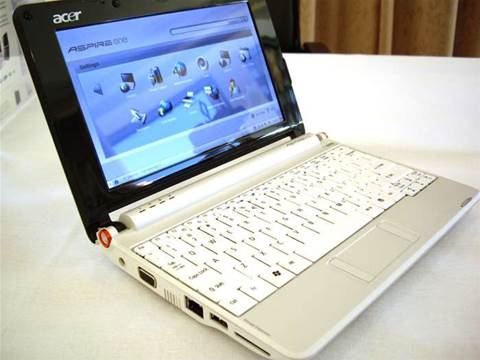Chris Liddell, the chief financial officer at Microsoft, claimed that the cheap little laptops which tend to run cheaper versions of Windows are to blame for the decreased revenues, but says it may still be too early to know whether netbooks will cannibalise sales of Microsoft’s OS, or create a new market.
In a report for market research outfit, Citigroup, Global Markets Analyst Brent Thill claimed, "Netbooks crash the party." He said they would be a "key category to watch in (fiscal 2009) as overall profitability will be impacted by (Microsoft's) success in this segment."
The report goes on to note that netbooks are not only growing at a steady pace, their sales are literally blowing the roof off any analyst expectations. Sales of the little laptops are set to reach 11 million in 2008 and shoot up to 41 million by 2012, an outstanding growth level considering only half a million netbooks were sold last year.
The little Eee PC from Asus as well as Acer’s Aspire have counted for approximately a third of total growth in the PC market in 2008, a record by anyone’s standards. And in Europe, where wireless providers are handing out free netbooks with service contracts, the little machines are flying off shelves.
So, how does this affect Microsoft? Well, for starters, a full 25 per cent of all netbooks run a Linux OS instead of a Microsoft one. Secondly, because Vista is too demanding in terms of systems requirements and memory guzzling, most netbooks which do run Windows are running the watered down version of XP, XP Home.
Microsoft was recently forced to extend the availability of XP Home, at least until mid 2010, precisely because netbook makers refused to bung Vista on their systems, saying they would hold out until Windows 7 tipped up.
Because XP Home licences are so much cheaper than Vista licences, the Redmond Giant is losing out. And if Microsoft really does want to bury Linux, when Windows 7 comes out, the version for netbooks will have to be a cheaper one, lowering Microsoft’s margins.
"You can't charge 100 bucks for an operating system on a machine that costs US$299," IDC researcher, Bob O'Donnell told the San Francisco Chronicle.
Liddell seems well aware of this but points out that, for most people, netbooks are not their primary machine, noting "If you look at the price points of some of the netbooks, they are US$300 to US$400. Clearly that is attractive for a lot of people in terms of adding a third or fourth PC to their homes. So it will affect the margins, but some of that will be incremental growth that we wouldn't otherwise have had."
Microsoft will have time to think about ways to deal with the situation, because the way it looks from here, netbooks aren’t going away any time soon.
Netbooks eat into Microsoft revenues
By
Sylvie Barak
on Nov 11, 2008 1:23PM

Got a news tip for our journalists? Share it with us anonymously here.
Partner Content
_(27).jpg&h=142&w=230&c=1&s=1)
Promoted Content
Why Renew IT Is Different: Where Science, AI and Sustainability Redefine IT Asset Disposition

Promoted Content
Have ticket queues become your quiet business risk?
.jpg&h=142&w=230&c=1&s=1)
New Microsoft CSP rules? Here’s how MSPs can stay ahead with Ingram Micro
.png&h=142&w=230&c=1&s=1)
How mandatory climate reporting is raising the bar for corporate leadership

Think Technology Australia deliver massive ROI to a Toyota dealership through SharePoint-powered, automated document management







.jpg&w=100&c=1&s=0)











